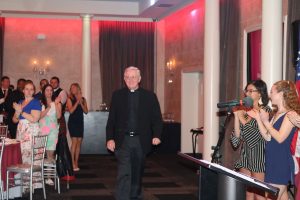Audit examines effectiveness of recycling strategies
October 17, 2012
History was made at Iona on Tuesday Oct. 16, with the first ever trash audit taking place at the grounds shop at 45 Beechmont Drive.
The event was conducted by Andy Albrecht from Iona Facilities as well as Tony Reinl and Ralph Tana, both from Waste Management in collaboration with IC Green and Professor Fredrica Rudell, the Chair of Iona’s Environmental Concerns Committee (ECC).
The aim of the audit according to the Waste Management Public Sector representative, was to determine the effectiveness of Iona’s strategies for recycling across campus. This was done by taking the bags of both garbage and recycling bins from three different locations and seeing what was inside.
“The goal is to try and get the students more involved with the program for helping to extend or expand the diversion rate on your recycling, ultimately helping to improve your sustainability goals,” Reinl said.
At least one bag of trash came from the Vitanza Commons in Spellman Hall, the LaPenta Marketplace and Loftus Residence Hall and was weighed. The bags were then opened and recyclable materials were separated from the other waste.
Once everything that could be salvaged as recyclable was removed, the two separate bags were weighed to see how much each weighed by itself.
After going through all the bags, Waste Management was able to roughly estimate that 35 percent of what Iona throws away could be recycled based upon the three sample campus buildings.
This number not only raises the concern of environmental impact, but also the economic results of inefficient waste disposal. It costs about half as much to recycle as it does to dispose of trash in dollars per ton, making the throwing out of bottles and cans an expensive action.
There was also a great number of things that were either damaged or destroyed from food waste, making what could have been recycled into trash. For example, a plastic salad container that still contains pieces of lettuce cannot be recycled. Yet, with one swipe of a napkin to remove food particles, what was once trash is now recyclable. In addition, items that can be reused take up significantly less space in landfills than those that cannot.
The students in attendance were mostly from IC Green, a student run organization dedicated to educating and increasing awareness about environmental issues in the Iona Community and beyond.
Many of them felt the audit showed where Iona lacks in its commitment to environmental stewardship. When asked, sophomore Molly Kallaway said this is most likely due to laziness. “Everyone knows bottles and cans are recyclable,” said Kallaway. “They just don’t want to make the effort.”
IC Green President Christina Grafstein said the audit was a huge step forward for Iona in the effort to become a more green campus. “I felt it was absolutely vital,” said Grafstein. “I think that the campus population for the most part doesn’t realize the impact of not recycling and the money that is wasted.”
Rudell, who has been an active voice for a greener Iona for many years, was glad to final have Waste Management come to give professional advice to help improve Iona’s recycling program.
“As we learned today, every ton of paper, plastic, glass and metal cans diverted from trash to recycling not only saves those materials for re-use and keeps them out of landfills, but saves the college significant amounts of money,” Rudell said. “A green campus is truly green, in both senses of the word.” Rudell has helped Iona towards many environmentally responsible decisions with her work in the ECC, including bringing single stream recycling to campus.
More information regarding Iona’s recycling policy can be found on the ECC page on the college website, and Waste Management also has information regarding specific programs focused of recycling on college campuses.







